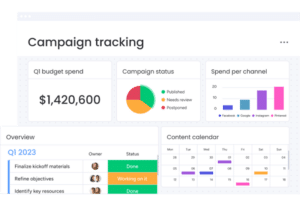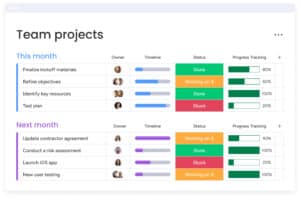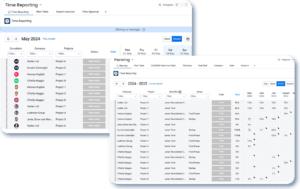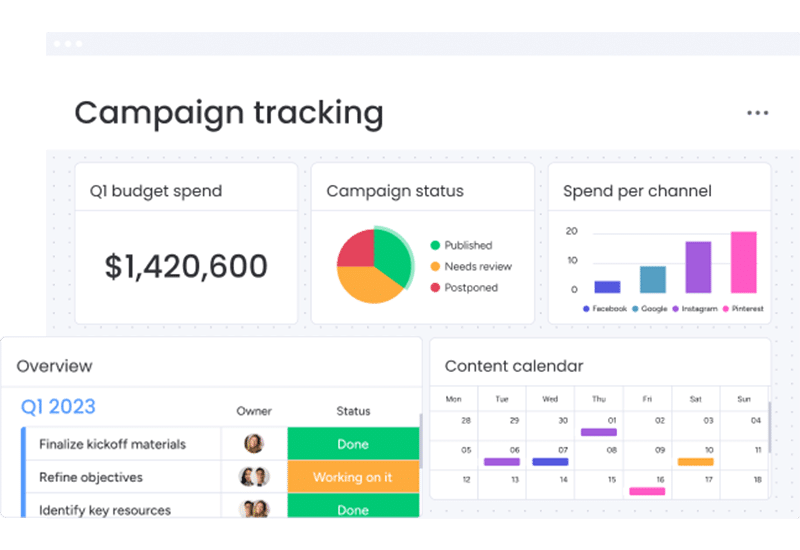Introduction to CRM in E-commerce
The digital marketplace is a bustling, ever-evolving landscape, and e-commerce businesses are at its heart. With the ever-so-popular online shopping, the competition to attract and retain customers has intensified. Here, harnessing the power of CRM (Customer Relationship Management) for e-commerce businesses isn’t just an advantage; it’s a necessity.
CRM: More Than Just a Customer Database
At its core, CRM is about understanding and managing your interactions with current and potential customers. It’s a technology for managing all your company’s relationships and interactions with customers and potential customers. However, in the realm of e-commerce, CRM transcends its traditional role. It’s not just a database of customer details; it’s a powerful tool that can reshape the way you engage with your audience.
The Symbiotic Relationship Between E-commerce and CRM
E-commerce thrives on data – customer preferences, purchase history, and browsing patterns. CRM systems adeptly capture and analyze this data, offering insights that are gold for any e-commerce business. This synergy makes harnessing the power of CRM for e-commerce businesses a strategic imperative. It allows for personalized marketing, targeted promotions, and, importantly, building lasting relationships with customers.
The Evolution of Customer Expectations
In today’s digital era, customers expect more. They seek personalized experiences, responsive service, and a connection that feels genuine. This is where CRM steps in. By harnessing the power of CRM for e-commerce businesses, companies can meet these expectations head-on. It enables businesses to not just respond to customer needs but to anticipate them, creating a proactive rather than reactive strategy.
In conclusion, as e-commerce continues to grow and evolve, CRM stands out as a vital strategic asset. By effectively harnessing the power of CRM for e-commerce businesses, companies can unlock a world of opportunities. From personalized customer journeys to data-driven decision-making, CRM is the engine that powers the modern e-commerce machine.
Key Benefits of CRM for E-commerce Businesses
In the dynamic world of e-commerce, staying ahead is about understanding and leveraging customer relationships. This is where the role of CRM becomes pivotal. By harnessing the power of CRM for e-commerce businesses, several key benefits emerge, propelling businesses toward growth and customer satisfaction.
Personalized Customer Experiences
One of the most significant advantages of CRM in e-commerce is the ability to create highly personalized customer experiences. By analyzing customer data – from purchase history to browsing behaviour – CRM tools enable e-commerce businesses to tailor their offerings and communications. This personalization goes a long way in enhancing customer engagement and loyalty, translating into repeat business and positive word-of-mouth.
Enhanced Customer Retention Strategies
Customer retention is as crucial as acquisition in e-commerce. Harnessing the power of CRM for e-commerce businesses allows for the implementation of sophisticated retention strategies. CRM systems can identify patterns and predict customer behaviours, helping businesses to proactively engage with customers at critical touchpoints, thus increasing the likelihood of retaining them.
Streamlined Sales Processes and Marketing Efforts
Another key benefit of CRM in e-commerce is the streamlining of sales and marketing processes. By consolidating customer information and interactions in one place, CRM systems provide a unified view of the customer journey. This integration allows for more efficient, targeted marketing campaigns and a smoother sales process, which in turn can lead to increased sales and revenue.
Data-Driven Insights for Business Growth
Harnessing the power of CRM for e-commerce businesses also means having access to a wealth of data-driven insights. CRM tools can analyze vast amounts of data to provide actionable insights on market trends, customer preferences, and potential areas of growth. These insights are invaluable for strategic planning and can help e-commerce businesses stay ahead of the competition.
Building a Foundation for Long-Term Success
Ultimately, CRM is not just a tool but a foundation for long-term success in the e-commerce sector. By harnessing its power, e-commerce businesses can build stronger relationships with their customers, streamline their operations, and make informed decisions based on real-time data. In an increasingly competitive digital marketplace, CRM is an indispensable asset for any e-commerce business looking to thrive.
Omnitas Newsletter
Sign up for our monthly newsletter to stay up-to-date on our latest blog articles, videos and events!
Thank you!
You have successfully joined our subscriber list.
Implementing CRM in E-commerce: Best Practices
While recognizing the importance of CRM in e-commerce is vital, the true value comes from its effective implementation. Here are some best practices to consider when harnessing the power of CRM for e-commerce businesses.
Choosing the Right CRM for Your Business
The first step is selecting a CRM system that aligns with your e-commerce business needs. Factors to consider include scalability, integration capabilities with existing e-commerce platforms, user-friendliness, and the specific features that cater to your unique business processes. It’s important to choose a CRM that grows with your business and adapts to the changing e-commerce landscape.
Integrating CRM with Existing E-commerce Platforms
Integration is key to maximizing the benefits of CRM. A CRM system should seamlessly integrate with your existing e-commerce platform, along with other tools such as email marketing software, social media channels, and customer service platforms. This integration ensures a unified approach to customer data and interactions, providing a comprehensive view of the customer journey.
Training and Adoption: Key to Success
The implementation of a CRM system isn’t just about the technology; it’s also about the people using it. Effective training and encouraging adoption among your team are crucial. Staff should be trained not only on how to use the CRM system but also on understanding its importance in enhancing customer relationships and driving business growth.
Maintaining Data Quality
Data is the lifeblood of CRM. Maintaining high-quality, accurate, and up-to-date customer data is essential. Regular audits and clean-ups of the CRM database ensure that the system remains a reliable resource for decision-making and customer engagement strategies.
Measuring Success and Making Adjustments
Finally, continuously measuring the performance of your CRM system is vital. Regularly assess how the CRM is impacting your sales, customer satisfaction, and overall business efficiency. Be prepared to make adjustments based on these insights to ensure that you are fully harnessing the power of CRM for your e-commerce business.
Leveraging CRM Data for Strategic Decision Making
In the landscape of e-commerce, data-driven decision-making is the linchpin of success. Harnessing the power of CRM for e-commerce businesses involves not just collecting customer data, but turning that data into strategic insights. Here’s how CRM data can be a game-changer in making informed business decisions.
Analyzing Customer Data for Insights
The wealth of data available through CRM systems is invaluable. It includes customer purchase history, preferences, feedback, and engagement metrics. By analyzing this data, e-commerce businesses can gain deep insights into customer behaviour and preferences. This analysis can inform everything from product development to personalized marketing strategies, ensuring that efforts are aligned with customer needs and trends.
Forecasting Sales and Market Trends
CRM data is a powerful tool for forecasting future sales and market trends. By examining historical data and current market conditions, businesses can anticipate changes in customer behaviour, seasonal demands, and emerging market trends. This foresight allows e-commerce businesses to stay ahead of the curve, stocking the right products at the right time and adjusting marketing strategies to meet evolving customer demands.
Enhancing Customer Service and Support
CRM data plays a critical role in enhancing customer service. By harnessing the power of CRM for e-commerce businesses, customer service teams can access comprehensive customer histories, enabling them to provide more personalized and effective support. This approach not only improves the customer experience but also builds loyalty and trust, which are essential in the competitive e-commerce space.
Optimizing Marketing Campaigns
CRM data allows for the optimization of marketing campaigns by providing insights into which strategies are most effective. E-commerce businesses can track the performance of different marketing channels, identify the most profitable customer segments, and understand the customer journey. This leads to more targeted, effective marketing efforts, maximizing ROI and ensuring that marketing budgets are well spent.
Informing Product Development and Pricing Strategies
Finally, CRM data can inform product development and pricing strategies. By understanding customer preferences and market trends, e-commerce businesses can tailor their product offerings to meet customer needs. Additionally, data-driven insights can guide pricing strategies, helping businesses to find the right balance between competitiveness and profitability.
Overcoming Challenges in CRM Implementation
Implementing a CRM system in the e-commerce sector can bring transformative benefits, but it’s not without its challenges. Understanding and addressing these challenges is crucial for harnessing the power of CRM for e-commerce businesses effectively.
Addressing Common Roadblocks
The road to CRM implementation can be paved with several obstacles — from choosing the right platform to integrating it seamlessly with existing systems. One common challenge is resistance to change within the organization. Overcoming this involves clear communication about the benefits of the CRM, and involving team members in the selection and implementation process.
Data migration is another significant challenge. Transferring existing customer data into a new CRM system requires meticulous planning and execution to ensure data integrity and continuity.
Ensuring Data Security and Privacy
In the era of data breaches and stringent data protection laws, ensuring the security and privacy of customer data is paramount. E-commerce businesses must ensure that their CRM systems comply with regulations like GDPR and have robust security measures in place. This not only protects the business and its customers but also builds trust and credibility.
Customization and Integration Issues
Each e-commerce business is unique, and a one-size-fits-all CRM solution is rarely effective. Customization to suit specific business processes and needs is often necessary, which can be complex. Additionally, integrating the CRM with other tools and systems used by the business can pose challenges. Businesses need to ensure that their CRM system can integrate smoothly with these tools to avoid silos of information.
Managing CRM Complexity
As CRM systems become more feature-rich, they can also become more complex. This complexity can be a barrier to effective use, especially if the users are not adequately trained. Businesses should focus on ensuring that their CRM system is user-friendly and that comprehensive training is provided to all users.
Keeping Up with Evolving CRM Technologies
Finally, the CRM technology landscape is continually evolving. Staying updated with the latest developments and understanding how they can benefit the business is essential. This may involve regular system updates or even switching to more advanced systems as the business grows.

The Future of CRM in E-commerce
As e-commerce continues to evolve at a rapid pace, we can see that the future of CRM in this sector is set to become even more integral and innovative. Understanding the trajectory of CRM advancements will help e-commerce businesses stay ahead of the curve. Below are some areas which we believe will be in the spotlight during upcoming years.
Emerging Trends and Technologies in CRM
The future of CRM in e-commerce is marked by emerging trends and cutting-edge technologies. Artificial Intelligence (AI) and Machine Learning (ML) are at the forefront, offering smarter analytics, predictive insights, and enhanced customer interactions. We’re looking at CRM systems that not only store information but also learn from it, providing recommendations for personalized customer engagement and optimized business processes.
Another trend is the integration of CRM with emerging technologies like Augmented Reality (AR) and Virtual Reality (VR), which can revolutionize the way customers interact with products online, offering immersive and interactive experiences.
Enhanced Focus on Customer Experience
The future of CRM is also about a heightened focus on customer experience. It’s no longer just about managing relationships; it’s about delighting customers at every touchpoint. This involves a more holistic approach, integrating CRM with all customer-facing aspects of the business to provide a seamless, engaging experience.
Mobile CRM and Accessibility
Mobile CRM is becoming increasingly important, reflecting the shift in both consumer and workforce behaviour towards mobile devices. CRM systems will need to be more mobile-friendly, allowing businesses to access customer data and insights on the go, and enabling real-time responses to customer needs.
Data Privacy and Ethical Considerations
As CRM systems become more sophisticated in data collection and analysis, e-commerce businesses will face growing scrutiny regarding data privacy and ethical considerations. Future CRM solutions will need to balance advanced data capabilities with stringent data protection and ethical standards.
CRM as a Collaborative Tool
Looking ahead, CRM is expected to evolve from a tool primarily for sales and marketing to a collaborative platform integrating various departments like customer service, supply chain, and even product development. This integrated approach ensures that all parts of the business are aligned in understanding and serving customer needs.
Conclusion
As we’ve explored throughout this discussion, the role of CRM in e-commerce is not just influential; it’s transformative. From personalized customer experiences to strategic decision-making, the impact of harnessing the power of CRM for e-commerce businesses is profound and multifaceted.
Recap of CRM Benefits for E-commerce
CRM systems offer e-commerce businesses a wealth of benefits. They enable personalized marketing, improve customer retention, streamline sales and marketing processes, and provide invaluable data-driven insights. By overcoming implementation challenges and staying abreast of future trends, e-commerce businesses can maximize these benefits.
The Vital Role of CRM in E-commerce Success
In the competitive world of e-commerce, CRM is no longer a luxury; it’s a necessity. It’s the key to understanding and connecting with customers in a digital landscape where personalization and customer experience are paramount. As e-commerce continues to evolve, the role of CRM will only grow in importance.
Embrace CRM for E-commerce Success
For e-commerce businesses looking to thrive in today’s digital economy, the message is clear: embracing and harnessing the power of CRM is essential. It’s not just about implementing a system; it’s about integrating CRM into the very fabric of your business strategy.
As we conclude this insightful journey into the world of CRM for e-commerce, we invite you to stay connected and continue exploring such transformative topics. If you’ve found value in this article and are eager for more insights into marketing, sales, IT, and other business-critical areas, we have just the resource for you. Sign up for our monthly newsletter below and gain access to a wealth of knowledge. Our newsletter brings you the latest and most compelling articles, videos, webinars, and events, all designed to keep you informed and ahead in your field.
In addition, for those looking to experience the transformative power of CRM firsthand, we have an exciting opportunity. We’re pleased to offer you a chance to try out monday.com‘s CRM system for free. Known for its user-friendly interface and powerful features, monday.com‘s CRM can be a game-changer for your business. Explore its capabilities, see how it fits into your operations, and witness the impact it can have on your customer relationships and sales processes. Use the link below to try it out!
























